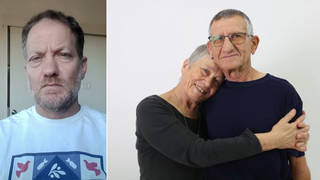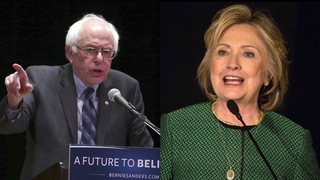
Guests
- Greg Grandinprofessor of Latin American history at New York University. His most recent book is titled Kissinger’s Shadow: The Long Reach of America’s Most Controversial Statesman.
We turn now to the issue of U.S. policy in Latin America and how it’s been raised in the 2016 presidential election. During Thursday’s debate, Marco Rubio and Ted Cruz slammed President Obama for moving to normalize relations with Cuba. Trump, who had endorsed Obama’s efforts, backed away, saying a better deal should have been struck. Meanwhile, on Wednesday night, former Secretary of State Hillary Clinton criticized Bernie Sanders over comments he made during the 1980s about Cuba and Nicaragua.
Transcript
JUAN GONZÁLEZ: As we continue discussing last night’s Republican debate, let’s turn to the issue of Cuba, where there was an interesting interchange between or exchange between them. This clip begins with CNN moderator Dana Bash.
DANA BASH: Mr. Trump, you said the concept of opening Cuba is fine. You said the concept of opening Cuba is fine. Why do you agree with President Obama and disagree with what Senator Rubio just said?
DONALD TRUMP: Well, I don’t really agree with President Obama. I think I’m somewhere in the middle. What I want is I want a much better deal to be made, because right now Cuba is making—as usual with our country, we don’t make good deals. We don’t have our right people negotiating. We have people that don’t have a clue. As an example, I heard recently where the threat was made that they want reparations for years of abuse by the United States, and nobody’s talking about it, and they’ll end up signing a deal, and then we’ll get sued for $400 billion or a trillion dollars. …
DANA BASH: Mr. Trump, are you saying that if you were president, you would continue the diplomatic relations, or would you reverse them?
DONALD TRUMP: I would want to make a good deal. I would want to make a strong, solid, good deal, because right now everything is in Cuba’s favor. Right now everything, every single aspect of this deal, is in Cuba’s favor. It’s the same way as the Iran deal. We never walked—we never—all we do is keep giving. We give and give and give.
DANA BASH: Mr. Trump, just to be clear, there is an embassy that you would have to decide whether it would be open or whether you would close it. Which would it be? In Havana.
DONALD TRUMP: I would probably have the embassy closed until such time as a really good deal was made and struck by the United States.
SEN. MARCO RUBIO: All right, first of all, the embassy is the former consulate. It’s the same building, so it could just go back to being called a consulate. We don’t have to close it that way. Second of all, I don’t know where Cuba is going to sue us, but if they sue us in a court in Miami, they’re going to lose. Third—third, on the issue of a good deal, I know what the good deal is. I’ll tell you what the good deal now is, already codified. Here’s a good deal: Cuba has free elections; Cuba stops putting people in jail for speaking out; Cuba has freedom of the press; Cuba kicks out the Russians from Lourdes and kicks out the Chinese listening station in Bejucal; Cuba stops helping North Korea invade [sic] U.N. sanctions; Cuba takes all of those fugitives of American justice, including that cop killer from New Jersey, and send her back to the United States and to jail where she belongs. And you know what? Then we can have a relationship with Cuba. That’s a good deal.
DANA BASH: Thank—thank you, Senator Rubio. Senator Cruz, if you become president—Senator Cruz, if you become president, would you reverse course and once again break diplomatic relations with Cuba?
SEN. TED CRUZ: Yes, I would. And, you know, I think this exchange actually highlights a real choice for Republican primary voters. When it comes to foreign policy, do you want to continue on the same basic trajectory as the last seven years of the Obama foreign policy?
JUAN GONZÁLEZ: That was—that was Ted Cruz in the exchange between the three of the candidates over the issue of Cuba. And as Linda mentioned before, this debate, there were a few areas where Donald Trump seemed almost like the most reasonable one—on Cuba, on Israel and Palestine and also on Social Security. He also was the only one defending or preserving Social Security as it is. Greg Grandin, your response to this Cuba exchange?
GREG GRANDIN: Yeah, well, I think you’re seeing Donald Trump is challenging the orthodoxy, both the Republican orthodoxy but also the Clintonian orthodoxy, about neoconservativism and militarism. And in Cuba, in particular, that has collapsed. It’s collapsed because the Obama administration and Raúl Castro have moved to normalize relations. And what—that had the effect of kind of nationalizing the question, so no more do candidates have to go to Florida and prove they’re going to be tougher than the next on Cuba. Now, whoever wins the Republican primary is going to have to go to Iowa or Ohio and say why they want to go back to the past and not be able to trade with Cuba. So I think it’s completely shifted, and I think Trump is ahead of the curve here. I also think there’s demographic changes in Florida. And it’s just the complete collapse of neoconservative interventionism and militarism, neoliberal and neoconservative interventionism, of which Cuba was one particular plank of that platform. And it’s just the ruins of that, and whoever is a candidate of the future is going to have to figure out a new policy. And I think Trump here is speaking the language of the future, as are the Democrats now.
AMY GOODMAN: I wanted to turn to the Democrats now on Cuba. During Wednesday’s Democratic debate on Univision, Bernie Sanders was questioned about comments he made during the 1980s about Cuba and Nicaragua.
MARÍA ELENA SALINAS: In 1985, you praised the Sandinista government, and you said that Daniel Ortega was an impressive guy. This is what you said about Fidel Castro. Let’s listen.
MAYOR BERNIE SANDERS: You may recall way back in—when was it?—1961, they invaded Cuba. And everybody was totally convinced that Castro was the worst guy in the world, all the Cuban people were going to rise up in rebellion against Fidel Castro. They forgot that he educated their kids, gave them healthcare, totally transformed the society.
MARÍA ELENA SALINAS: In South Florida, there are still open wounds among some exiles regarding socialism and communism. So please explain what is the difference between the socialism—
SEN. BERNIE SANDERS: Well—
MARÍA ELENA SALINAS: —that you profess and the socialism in Nicaragua, Cuba and Venezuela.
SEN. BERNIE SANDERS: Well, let me just answer that. What that was about was saying that the United States was wrong to try to invade Cuba, that the United States was wrong trying to support people to overthrow the Nicaraguan government, that the United States was wrong trying to overthrow in 1954 the government—democratically elected government of Guatemala. Throughout the history of our relationship with Latin America, we’ve operated under the so-called Monroe Doctrine. And that said that the United States had the right do anything that they wanted to do in Latin America.
So I actually went to Nicaragua, and I very strongly opposed the Reagan administration’s effort to overthrow that government. And I strongly opposed earlier Henry Kissinger and the—to overthrow the government of Salvador Allende in Chile. I think the United States should be working with governments around the world, not get involved in regime change. And all of these actions, by the way, in Latin America brought forth a lot of very strong anti-American sentiments. That’s what that was about.
HILLARY CLINTON: And I just want to add one thing to the question you were asking Senator Sanders. I think in that same interview he praised what he called the revolution of values in Cuba and talked about how people were working for the common good, not for themselves. I just couldn’t disagree more. You know, if the values are that you oppress people, you disappear people, you imprison people, even kill people, for expressing their opinions, for expressing freedom of speech, that is not the kind of revolution of values that I ever want to see anywhere.
AMY GOODMAN: That’s Hillary Clinton and Bernie Sanders and a clip of Bernie Sanders from the ’80s that Univision played. Greg Grandin?
GREG GRANDIN: Well, one, I don’t think that redbaiting is going to work. I think the demographics have changed. I think the frame has changed. I think that people’s concerns are changed. I think the generations have changed. I think Clinton was going for an old-fashioned redbaiting of Bernie Sanders.
What’s interesting about that Bernie Sanders clip is that it’s from 1985. And if you go back to 1985, it was a mainstream, establishment liberal position to be opposed to Contra funding. The Boland Amendment had overwhelming liberal mainstream support. Jim Wright, the speaker of the House in Texas, who used to—who used to be a Somocista money man, he had close ties to Nicaraguan dictatorships; he a good things to say about the Sandinistas.
So, in Hillary Clinton’s worldview, interventionist worldview, she has come so far that to say good things about the Sandinistas in 1985 is supposedly outside the mainstream—I think she’s completely wrong. I think it’s going to backfire. And I think Bernie Sanders, by doing that, and by not—by not ceding ground, by not apologizing, I think he’s actually doing a service. He’s educating the electorate once again about not interventionism.
JUAN GONZÁLEZ: Well, that’s what it seemed to me, that, in essence, he was doing a history lesson to the—
GREG GRANDIN: Yeah.
JUAN GONZÁLEZ: —to the audience about the nature of American interventionism over the past century, really.
GREG GRANDIN: Yeah, this primary campaign is an education, especially for many of his millennial voters—right?—who are too young to know half of the names that he drops. I mean, in his interview with Chris Matthews, he name-dropped Patrice Lumumba, Trujillo in Dominican Republican, Allende, Árbenz, all of these people. And what he’s trying to do is he’s trying to insert the importance of history, of cause and effect, of blowback, that if the U.S. does something, it might actually have an effect, a negative effect, and might actually have consequences. Clinton, I think, lives in that world in which we can act, and the negative consequences of that action, whether it be the rise of radical Islam or whether it be the destruction of Honduras, doesn’t matter; we can just act again.












Media Options